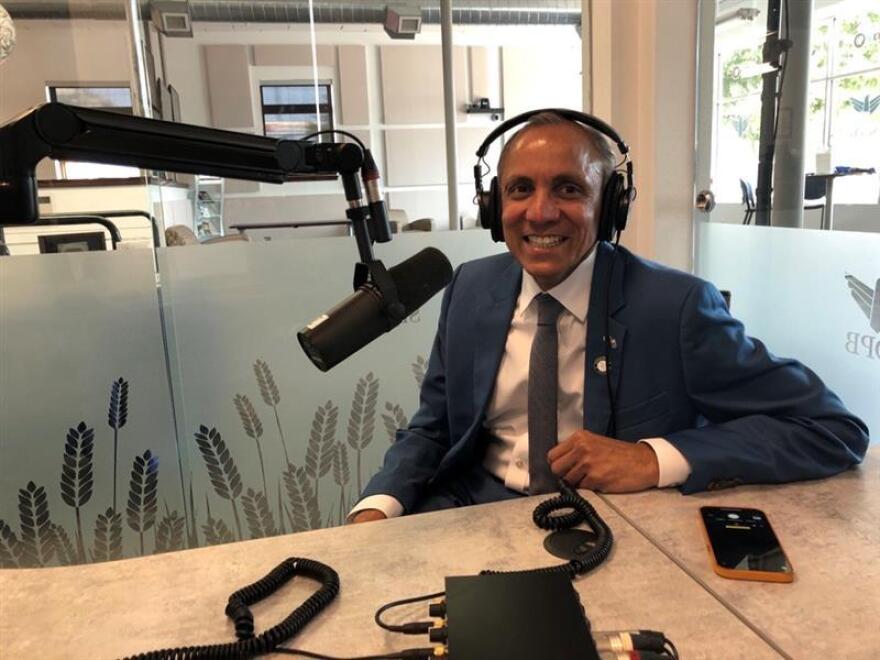This interview is from SDPB's daily public-affairs show, In the Moment, hosted by Lori Walsh.
A federal judge has voided the Biden administration's mask mandate for public transportation. Now that masks are optional on airplanes, immunocompromised travelers are seeking additional ways to protect themselves from COVID exposure.
Shankar Kurra, M.D., is vice president of medical affairs for Monument Health in Rapid City. He says nearly 80 percent of COVID-related deaths in the United States have been in people over the age of 50.
"The recommendations continue to stay the same," Kurra explains. "You're at highest risk if you are 50 and older or if you have immunocompromising conditions including cancer diagnosis and being actively treated for cancer. Your best protection is to continue to wear a well-fitting at least N-95 mask. That will truly protect you."
According to the CDC, wearing a well-fitting N-95 mask reduces the risk of COVID infection by up to 85 percent. Dr. Kurra says South Dakotans over 50 should seek out a fourth COVID vaccine dose.
The following transcript has been autogenerated and edited for clarity.
Lori Walsh:
So, let's talk about what we can control and what we can't, when other people are not wearing masks.
Shankar Kurra:
Yes, Lori, great question. Two years after the pandemic, we know certain things very clearly. The vast majority of, unfortunately, deaths have occurred in that 50 and above (age range) — almost up to 80% of all deaths in the United States. Additionally, we also know that 50 and older, with comorbidities puts them at risk. So, the recommendations continue to stay the same. You're at highest risk if you're 50 and older, or if you have immune compromising conditions, including cancer diagnosis and being actively treated, especially for cancer. Your best protection is to continue to wear a well-fitting, at least N95 mask, and that will truly protect you.
Lori Walsh:
Tell me a little bit about people who are not vaccinated at this point, who are not in that risk group. They're under the age of 50, they're in good health, and they decided not to get vaccinated. At this point, smooth sailing for them? Or does there look like there's something on the horizon that they should be concerned about and still seek out vaccination?
Shankar Kurra:
Death is one marker endpoint that we always worry about as health professionals. The other thing is chronic disease and any impact on the vital organs. From that standpoint, age is not a risk factor. So, anyone who's unvaccinated, even if they're in the prime of health, and even if they're younger than 50 years of age are at risk for long COVID, and for any effect from COVID itself. It's unpredictable who will suffer long-term effects or even require hospitalization and make it, but just making it alone does not free you from that risk. So, the bottom line is COVID is still a deadly disease. It's very important to consider your risks. The best advice I can give is knowing that it's transmissible through the air through aerosols and talking especially, and coughing and sneezing makes it worse, but breathing is the lowest risk.
Shankar Kurra:
The best thing you can do is to wear a mask in closed indoor spaces with poor ventilation, so that's pretty much most places. In the aircraft, I would still wear the mask in order to protect yourself and to help others. But obviously, now that it's optional, folks can choose to do that as well.
Lori Walsh:
Will wearing your own N95 mask on an aircraft really protect you, or just protect people around you?
Shankar Kurra:
Yes, the studies are very clear now. We have plenty of evidence. It's been published by the CDC on their MMWR, that if you are wearing a well-fitting N95 mask, your reduction is 85% from getting a positive test or getting the infection. Either way, you are well protected, so it protects you, and additionally, if you're at risk, you should be wearing a mask.
Lori Walsh:
What do we know about treatment for people who are getting ill? Are there better therapies and treatment now than there was at the beginning of the pandemic, and how soon should you talk to your doctor if you feel that you have symptoms, or if you, for example, take a home test and it's positive?
Shankar Kurra:
The pharmaceutical measures have definitely (improved); we have more options. One of them that we would like to see more use of Paxlovid, which is a medication that is very good for anyone who has had a recent diagnosis, so the sooner, the better. So, to answer that part of your question, if you test positive, even without symptoms, it's probably the right thing to do. Go see your doctor and they can prescribe that medication for you. If you're at high risk, then we, based on that, we also recommend other treatments, but there are treatments, we did not have it in before. We have them now, and they're not being utilized as well.
Lori Walsh:
Is it a matter of time before the next variant comes, or do you think we have enough immunity in our population where it's possible that we continue 'as is' for some time?
Shankar Kurra:
Yeah, there's a lot of good news on that front. The immune landscape is completely different from what it was as recent as a few months ago. Even after the first Omicron BA 1.1 wave through the United States, the best estimates today are that upwards of 90% of folks in this country have some form of immunity, either from an infection or from vaccination. So, that is the good news for the United States. I think, even if we had new variants, this is definitely helpful in reducing the more extreme outcomes of death and hospitalizations, but it won't prevent a mild infection. So, it's still a smart thing to prevent any form of infection, but definitely some protection is there.
Lori Walsh:
All right. So, if you're over 50, and you have the option of getting that next shot, a second booster, if you will, or a fourth trip to the pharmacy, get it now, even though numbers in South Dakota are looking pretty good or wait until fall?
Shankar Kurra:
I would say, get it now. That's the right thing to do.
Lori Walsh:
All right. I'll do it. All right.
Shankar Kurra:
Okay.
Lori Walsh:
That was a personal question! [laughter] Dr. Shankar Kurra, thanks so much. We appreciate your time.
Shankar Kurra:
Thank you, Lori. My pleasure.



